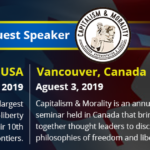
Can Government Intervention Help Economies Fight the COVID-19 Crisis? (Part 2)
Read the first article of this series here.
Businesses have always felt stifled by government regulations. A little more in some countries and a little

Could the Launch of African Continental Free Trade Area (AfCFTA) Deal Usher in a New Economic Era?
Brexit has been grabbing the headlines and all our attention. There’s a lot being said practically every day about the repercussions of ending free movement of labor. And, there are speculations around restrictions to the

From Vegas to Vancouver: Free Minds Across the World Get Together to Strive for Free Markets
It’s human nature. The more we’re restricted from doing something, the more we want to do it. It’s the same with government regulations. When governments

When Will India’s Aviation Industry Soar?
India’s civil aviation industry has come into the spotlight. It is among the fastest growing industries in the country, and India is poised to become the world’s third largest aviation market by 2024.
The Rationale of Free Markets
To have any meaningful understanding of a socio-economic system, one needs to first gain an insight into two things – one, what purpose it is meant to serve, and two, for whom it is supposed to serve that purpose.

Why India and Nepal Rank Low in Economic Freedom Index
On the face of it, economic freedom is a simple concept. However, it encompasses every aspect of an individual’s life. Economic freedom defines the standard of living and has a significant influence on the quality of life.
Equal Income Distribution – Characteristic of Free Economies?
The wealthiest countries are those that have free economies. There is a popular belief that the more capitalist economies in Europe, North America and even Asia (like Japan) have greater financial inequalities. But the true picture reflects a different scenario altogether. Such countries are better off than the socialist economies when it comes to distribution of wealth.
Free the People, Control the Government: A Lesson from Hong Kong
It is often believed that countries that are small are easy to govern. It is also believed that high population impedes economic development. There is one nation that shattered these popular beliefs… Hong Kong!
 Rakesh Wadhwa. Ever since, I was a school boy, I knew India was on the wrong path. Socialism was just not what we needed to get ahead. Government controlled our travel; government controlled our ability to buy and sell; and government controlled our freedom to move our money. My life has focused on the inherent rights people have. When I was in college, I never understood, what the governments meant by their "socialistic attitude". If people are free to buy, sell and move their capital themselves without any restrictions by state, then the welfare of people is inevitable & hence the countries they live in will become wealthy. The government has no right whatsoever, to point a finger at me or my business. I am not a revolutionary. I just want to light up my cigarette and not get nagged about it. I believe in non-interfering attitude to attain more.
Rakesh Wadhwa. Ever since, I was a school boy, I knew India was on the wrong path. Socialism was just not what we needed to get ahead. Government controlled our travel; government controlled our ability to buy and sell; and government controlled our freedom to move our money. My life has focused on the inherent rights people have. When I was in college, I never understood, what the governments meant by their "socialistic attitude". If people are free to buy, sell and move their capital themselves without any restrictions by state, then the welfare of people is inevitable & hence the countries they live in will become wealthy. The government has no right whatsoever, to point a finger at me or my business. I am not a revolutionary. I just want to light up my cigarette and not get nagged about it. I believe in non-interfering attitude to attain more. 
 The Bastiat Award is a journalism award, given annually by the International Policy Network, London. Bastiat Prize entries are judged on intellectual content, the persuasiveness of the language used and the type of publication in which they appear. Rakesh Wadhwa won the 3rd prize (a cash award of $1,000 and a candlestick), in 2006.
The Bastiat Award is a journalism award, given annually by the International Policy Network, London. Bastiat Prize entries are judged on intellectual content, the persuasiveness of the language used and the type of publication in which they appear. Rakesh Wadhwa won the 3rd prize (a cash award of $1,000 and a candlestick), in 2006.
What the readers are saying…